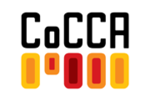Difference between revisions of "Council of Country Code Administrators"
| Line 14: | Line 14: | ||
| website = [http://www.cocca.cx cocca.cx] | | website = [http://www.cocca.cx cocca.cx] | ||
| blog = | | blog = | ||
| − | | facebook = | + | | facebook = [http://www.facebook.com/pages/CoCCA-Council/194651117230951 Profile] |
| linkedin = | | linkedin = | ||
| twitter = | | twitter = | ||
Revision as of 20:23, 4 August 2011
| Industry: | Registrar |
| Headquarters: | Drumsite, Christmas Island |
| Country: | Australia |
| Website: | cocca.cx |
| Facebook: | Profile |
Council of Country Code Administrators, or CoCCA, is a non-profit organization and a forum engaged in the collaboration of ccTLD managers. Membership to this organization is free.[1] The Council of Country Code Administrators is an active Domain Roundtable participant.
Services
CoCCA is involved in the following activities:[2]
- Deployment support
- Harmonized development of policy
- Training and technical support provisions for ccTLD members
- CoCCA OpenReg development, registry software
- Additional value added and upgrade features as per the demands and needs of the ccTLDs.
CoCCA Open Registry
The CoCCA OpenReg works on multiple platforms that include Solaris, MacOCX, Windows and Linux. This is an open source based registry, with complete Registry-Registrar components. The open registry is also capable of personalized Whois and Automatic PDF invoicing.[3]
Features
The zone generator customizable Whois feature of the CoCCA OpenReg allows the public to access all pertinent information. The open registry also offers the users a domain transfer feature, which allows full domain name transfer controlled by the registrant. Flexible customization applied to policies of registry and renewals are also some of the features of CoCCA OpenReg. It also enables automatic invoicing for bulk renewals as well as multiple annual renewals. The registration restriction feature is a key option, which controls use of offensive names and generic names such as names of places and famous personality names.[4]
Latest Additions
Since March 2011, the CoCCA Registry software was also updated with the extensions – CHIP (ClearingHouse for Intellectual Property) and Trademark (TM) EPP. The software is in use by the managers of more than 30 IDN and ASCII TLDs, with others transitioning to the service.[5] The CHIP technology has been implemented to safeguard the Internet rights of trademark owners effectively and efficiently. The CHIP validation trademark information will be made available through the historical abstracts and Whois registry.[6]
CoCCA and Expresso
The registry services platform, Expresso, is based upon CoCCA tools. It is one of the most widely used and deployed software. Over 20 high-level domains and more than 150 registrars have completely incorporated the platform. CoCCA is related to ccTLDs and Expresso is related to gLTDs.[7]
Mind + Machines and CoCCA
Mind + Machines has entered into an official agreement with CoCCA to develop the software for gLTDs together.[8]
Various business plans and other implementation schemes can be accommodated with the help of the upcoming combination of CoCCA and Expresso. Different languages such as English, French, Korean, Japanese, Spanish, Chinese and Arabic can be chosen by TLD operators. The fundamental code is in Java. For resolution, Whois information and registration, it adheres to the engineering stipulation. It can be used with IDNs and it supports DNSSEC and IPv6.[9]
CoCCA Registry ccTLDs users
- Christmas Island (.cx)
- Afghanistan (.af)
- Dominica (.dm)
- Timor-Leste (.tl)
- Legacy (.TP)
- Mauritius (.mu)
- Norfolk Island (.nf)
- South Georgia (.gs)
- Namibia (.na)
- Mangolia (.mn) (Use under discussion)
The members at CoCCA aim and work towards developing administrative policies, technologies and models through consensus in order to bring improvement in the technical stability, interoperability, utility and technical stability of the ccTLDs members with DNS.[10]
